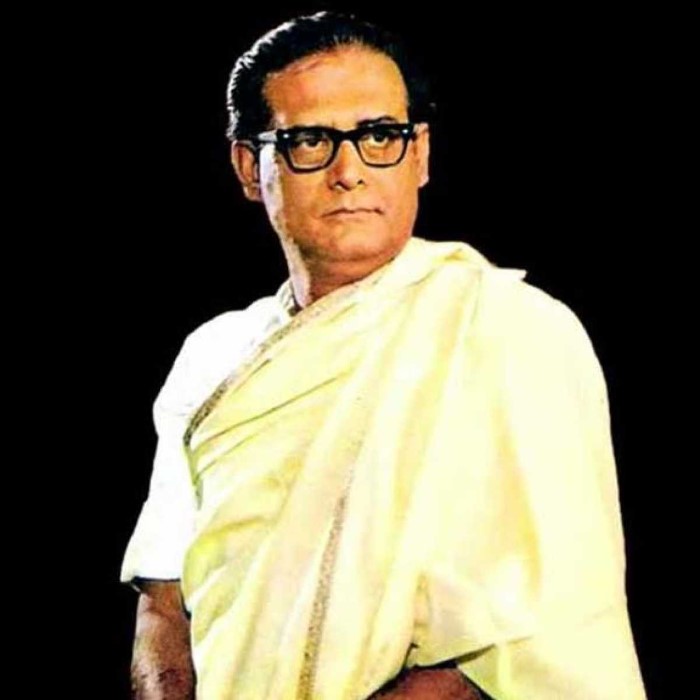Members
1 Male
Origin
 India
India
Genre
 OST
OST
Style
---
Mood
---
Born
1 Male
Origin
Genre
Style
---
Mood
---
Born
1920
Active 1935 to
![]() 1989
1989
Cutout![]()
No loved tracks found...
Artist Biography
Available in:
Hemanta Mukhopadhyay, known professionally as Hemant Kumar (16 June 1920 – 26 September 1989), was an Indian Bengali singer and music director who sang in Bengali, Hindi and other Indian languages like Marathi, Gujarati, Odia, Assamese, Tamil, Punjabi, Bhojpuri, Konkani, Sanskrit and Urdu. He was an artist of Bengali and Hindi film music, Rabindra Sangeet, and many other songs. He was the recipient of two National Awards for Best Male Playback Singer.
Hemanta Mukhopadhyay was the exclusive singing voice of Uttam Kumar. He was also popular as being the voice of actors Biswajit Chattopadhyay, Anil Chattopadhyay, Anup Kumar Das, Soumitra Chattopadhyay, Pradeep Kumar Batabyal and Dev Anand.
Under the influence of his friend Subhas Mukhopadhyay, Hemanta recorded his first song for All India Radio in 1935. The first line of the song was "Amar Ganete Ele Nabarupi Chirantanii." Hemanta's music career was primarily mentored by the Bengali musician, Sailesh Duttagupta. In his early life Hemanta used to follow the famous Bengali singer Pankaj Mullick. For this he was nicknamed as "Chhoto Pankaj". In an interview on television in the early 1980s, Hemanta had mentioned that he had also received classical music training from Ustad Faiyaz Khan's student Phanibhusan Gangopadhyay, but his tutelage was cut short by the Ustad's untimely death.
In 1937, Hemanta cut his first gramophone disc under the Columbia label. The songs (non-film) on this disc were "Janite Jadi Go Tumi" and "Balo Go Balo More" whose lyrics were by Naresh Bhattacharya and music was composed by Sailesh Duttagupta. Thereafter, every year Hemanta continued to record non-film discs for the Gramophone Company of India (GCI) till 1984. His first Hindi songs were "Kitana Dukh Bhulaya Tumne" and "O Preet Nibhanewali", released in 1940 under GCI's Columbia label. Music for these songs were composed by Kamal Dasgupta; lyrics were by Faiyaz Hashmi.
Hemanta's first film song was in the Bengali film Nimai Sanyas released in 1941. Music was scored by Hariprasanna Das. Hemanta's first compositions for himself were the Bengali non-film songs "Katha Kayonako Shudhu Shono" and "Amar Biraha Akashe Priya" in 1944. Lyrics were by Amiya Bagchi.His first Hindi film songs were in Irada (1944 film) in 1944 under Pt. Amarnath's music direction. Hemanta is considered the foremost exponent of Rabindra Sangeet. His first recorded Rabindra Sangeet was in the Bengali film Priya Bandhabi (1944). The song was "Pather Sesh Kothaye". He recorded his first non-film Rabindra Sangeet disc in 1944 under the Columbia label. The songs were "Aamar Aar Habe Na Deri" and "Keno Pantha E Chanchalata". Prior to that he had recorded the song "Aamaar mallikabone " in All India Radio/Akashvani but, unfortunately, the record has passed into oblivion.
His first movie as a music director was the Bengali film Abhiyatri in 1947. Although many of the songs Hemanta recorded during this time received critical acclaim, major commercial success eluded him until 1947. Some contemporary male singers of Hemanta in Bengali were Jaganmay Mitra, Robin Majumdar, Satya Chowdhury, Dhananjay Bhattacharya, Sudhirlal Chakraborty, Bechu Dutta and Talat Mahmood.
By the mid-1950s, Hemanta had consolidated his position as a prominent singer and composer. In Bengal, he was one of the foremost exponents of Rabindra Sangeet and perhaps the most sought-after male singer. In a ceremony organised by Hemanta Mukherjee to honour Debabrata Biswas (1911–1980), the legendary Rabindra Sangeet exponent, in Calcutta in March 1980, Debabrata Biswas unhesitatingly mentioned Hemanta as "the second hero" to popularise Rabindra Sangeet, the first being the legendary Pankaj Kumar Mallick. In Mumbai, along with playback singing, Hemanta carved a niche as a composer. He composed music for a Hindi film called Nagin (1954) which became a major success owing largely to its music. Songs of Nagin remained chart-toppers continuously for two years and culminated in Hemanta receiving the prestigious Filmfare Best Music Director Award in 1955. The very same year, he scored music for a Bengali movie called Shapmochan in which he played back four songs for the Bengali actor Uttam Kumar. This started a long partnership between Hemanta and Uttam as a playback singer-actor pair. They were the most popular singer-actor duo in Bengali cinema over the next decade.
In the latter part of the 1950s, Hemanta composed music and sang for several Bengali and Hindi films, recorded several Rabindra Sangeet and Bengali non-film songs. Almost all of these, especially his Bengali songs, became very popular. This period can be seen as the zenith of his career and lasted for almost a decade. He sang songs composed by the major music directors in Bengal such as Nachiketa Ghosh, Robin Chatterjee and Salil Chowdhury. Some of the notable films Hemanta himself composed music for during this period include Harano Sur, Marutirtha Hinglaj, Neel Akasher Neechey, Lukochuri, Swaralipi, Deep Jwele Jaai, Shesh Parjanta, Kuhak, Dui Bhai, and Saptapadi in Bengali, and, Jagriti and Ek Hi Raasta in Hindi.
Wide Thumb
Clearart
Fanart


Banner
User Comments
 No comments yet..
No comments yet..
